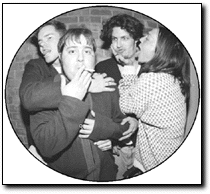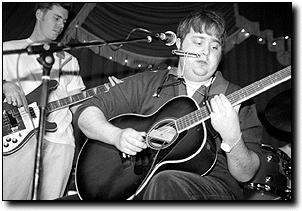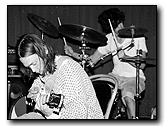![]()
![[ ARTS
]](/images/fall97/artsublogo.gif)
By Tom Collins
Arizona Daily Wildcat March 12, 1998
Dig It!

Dan Hoffman
Arizona Daily Wildcat
Shindig: left to right Kerry Dinsmore (bass), Shayne
Christie (vocals, guitar), Paul Niemic (drums), and Ryan Christie (guitar,
percussion). The band is playing Saturday at the 3rd Stone Bar and Grill
with the Sandrubies and at the Tammies next month.
Dan Hoffman Shindig: left to right Kerry Dinsmore (bass), Shayne Christie (vocals, guitar), Paul Niemic (drums), and Ryan Christie (guitar, percussion). The band is playing Saturday at the 3rd Stone Bar and Grill with the Sandrubies and at the Tammies next month. |
Does that clock say 9:35?" asks the cook with the cigarette, the scraggly ponytail.
"Yeah, why?"
"'Cos that means it's 9:20 and I get off at 10," he says, takes a drag, a swallow of beer, looks around. "Then it's time to party, party, party."
Looks around again.
"I hope some more people show up, or I'll be partying alone."
It's 9:25 Sunday night at the 3rd Stone Bar and Grill and there's no cover at the door. About fifteen people sit in pockets around the club, all velvet light and dark wood surfaces.
On stage, Kerry Dinsmore is moving equipment, plugging in, setting up.
At a table ten feet away, Ryan Christie is drinking with his friends, laughing; saying how the substance trickling out of the 3rd Stone fog machine smells like "seed smoke."
Paul Niemic is asleep on a couch in the back of the bar, across from the Janice/Jim rest rooms.
Nobody knows where Shayne Christie is.
This is Shindig.

Dan Hoffman Kerry Dinsmore (left), and Shayne Christie (right) get their mojo working at the 3rd Stone Bar and Grill Sunday. |
Kerry has played in three bands with seven or eight different names in 10 years of Tucson rock 'n' roll. Back in high school, Shayne asked him to pick up the bass so they could start a band together.
"We sat around my house, playing and watching Rattle and Hum," Kerry says.
Shindig is their most serious effort, he adds, an effort with more maturity.
The whole deal came together last year at Berky's on Fourth. Shindig - Kerry, Ryan, Paul and Shayne, along with then-violin player Dave - rolled up to Berky's in a recreational vehicle. Before the gig, the guys kept bringing pitchers of beer out to the R.V., knocking them back and tossing the pitchers out the front door.
"We played, we were trashed," says Kerry, a redhead with a boy-next-door smile. "People were passing out on the tables."
After the show, as the band loaded their gear, the manager came up to them, holding one of the pitchers. Kerry laughs. "He says 'This is why you'll never play in this town again.'"
Over the course of the last few months, the band has played and developed a sort of cult. Paul has called it the "Shindig Society." New people show up at every gig, but there's a group of 25 or 30 who are there almost each and every time. They show because they know the band, but more importantly, they show because the band is damn good. Damn good rock 'n' roll.
They can play country, they can play salsa, they can sound like the Allman Brothers, Crazy Horse, then turn on a dime and go white Funkadelic. There are six million songs in the mind of Shindig, which means they've got to do double duty - change tempos, change keys, change instruments.
Paul is 27. He didn't pick up the drums until he was 20. Before he played the drums, "I used to play games, I don't play games anymore."
Watch Paul play the drums. No, rather, listen to Paul play the drums. Not necessarily the drumming part, but the prizefighter breathing, the occasional yelps. Paul is a skinny, artsy-looking guy, overgrown pageboy haircut and a beatnik goatee. Paul's a painter by passion and he plays the drums like Jackson Pollack: a study in motion. He moves around the drum set like Pollack around the "Greyed Rainbow." He lays a splash of cymbal here, a crash there, always just right.
Between songs, Paul and Ryan never stop tapping, noodling, spacing, making sounds.
Ryan plays guitar like a sort of hippie model, very earnest and pretty, hunched over his instrument - the picture of concentration.
When Ryan was 12, Shayne taught him to play guitar.
"He kind of sat me down and made me play Beatles tunes," Ryan says. "Since we're brothers and my guitar playing came from him, we both kinda know what we're gonna do (when we're playing)."
Shayne Christie shows up around 10. When Shayne walks into the room you notice. Not because of his looks but because of his walk. He's a bulldog in a hurry, perpetually - misunderstood-genius intensity.

Dan Hoffman Ryan Christie, left, and Paul Niemic of Shindig rock out. |
He sits down with a plugged-in acoustic guitar as Paul, Kerry and Ryan start laying down the rhythm. He gets out a slide and starts playing, and sort of talking, blues.
"You can't escape unless you're willing to lose everything you choose," he raps. " This is where the story begins. Right now."
The band is off running; Shayne plays guitar like a heart attack bluesman: jowls, sleepless puffy eyes, tortured, malcontent. Urgent.
Shayne Christie moved to Tucson when he was two years old. He's been here ever since, learning how to play. Conversations with Shayne are peppered with references to local bands, bands he grew up listening to, or hanging out with. Bands that used to traipse through his house. He's an encyclopedia of local music lore.
This Saturday, when Shindig takes the stage at the 3rd Stone again, it will be a step toward some kind of local legitimacy. The band's playing with the Sandrubies. Shindig grew up listening to the Sandrubies, back when they were the Sidewinders. More than once, Shayne has told the story of how the Sidewinders were on their way to stardom, even hit the Rolling Stone alternative charts, before a forced name change screwed them.
Such is life in the music business.
Such is life - fleeting. That's the thing about Shindig. The band captures the inescapable momentum of life. They show up and play, no gimmicks, just rock. Though the whole band has a hand in writing and arranging the songs, the lyric responsibilities generally fall on Shayne. His words are ruminating, rustic, occasionally angry, all intense.
"Between the teeth where syllables hide, unable to find a reason, laid a blow to the motive, a victim of pride / The poison flows wide in scarlet rivers beneath the skin of the spectre," goes the country-rock tune "The Waltz."
Shayne seizes the essence of the inarticulate and the impending car accident of life. And it's not just the lyrics, but the way they're sung, the arrangement of the whole song that reaches out and grabs the audience. And it's the change, the silly, fast paced country-western coda of the song that turns the audience's whole perception in on itself, and leaves one celebrating being disconnected, isolated and on the road.
Take a song like "Jiffy Pop," a diatribe on talk show culture. The tune builds on the rhythm section to a mile-a-minute, remote-control frenzy of frustration and incomprehension - a blow-by-blow, harmonized, verbal assault on a world full of "spit-shined Cadillac gravy trains."
And then the song breaks and the band takes off for a new soundscape: all open spaces and just music, music, music.
There isn't a band in the world not looking to create a space, to find the place to create. There isn't a person who isn't.
Like Kerry says, nobody wants to work a nine-to-five job. "This is what keeps me sane," he says.
Tucson is a tough town to crack. Ask around, check you local listings - how many bars are showcasing live, local music? Ask a local music junkie how much the town still misses the Downtown Performance Center, how much of a blow the loss of the Airport Lounge is.
Ask Shayne.
"This town sucks to play in. I mean I grew up here, I love this place, but there's nowhere to go unless you're over 21, and then there are still not that many places," Shayne says. "If there's going to be a scene here, the bands have to support each other and the bars have to support the bands."
But at the same time, there are institutionalized obstacles to live music, Shayne says. It's tough to pull off a mixed-age venue because of the liquor laws for example, so it becomes difficult to attract an entire music listening audience.
Besides, bars simply fail, often.
"Airport Lounge was a great idea," says Shayne. "It was working, now it's closed. It's just hard to run a bar in this town. I don't why."
This is why people leave town if they want to make it. They go to Seattle, or Austin, or L.A. As has been said, Tucson is a place to go to get ready to go and do something somewhere else.
"I wish somebody would come down out of the heavens and put a scene here, until that happens, bands (will leave)," Shayne says.
This Saturday, regardless, at the 3rd Stone Bar and Grill there will be a clambake, a weenie roast, a hootenanny. A shindig.
Shindig plays the 3rd Stone, 500 N. Fourth Ave., Saturday at 9 p.m.with the Sandrubies. Call 628-8844 for more information.



